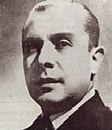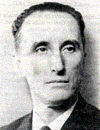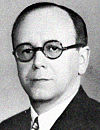Presidential elections were held in Chile on 4 September 1946.[1] The result was a victory for Gabriel González Videla of the Radical Party, who received 40% of the popular vote and 75% of the Congressional vote.
| |||||||||||||||||||||||||
| |||||||||||||||||||||||||
| |||||||||||||||||||||||||
Electoral system
The election was conducted using the absolute majority system, wherein a candidate had to secure more than 50% of the popular vote to be elected. In the event that no candidate obtained the required majority, both houses of the National Congress would convene to vote on the two candidates with the highest number of votes.[2]
Candidates
Gabriel González Videla
In early 1946, the Radical Party Congress took place in Valdivia from 24 to 27 January,[3] during which the presidential candidate was to be chosen. An internal vote was planned to decide between Gabriel González Videla and Arturo Olavarría, who had the support of the Duhaldista faction. However, shortly before the vote on 28 April, the Duhaldista faction withdrew their backing for Olavarría and abstained. Consequently, he suffered a significant defeat at the hands of his opponent.[4] The final results of the Radical Party's internal plebiscite were as follows:[5]
| Candidate | Party | Votes | % | |||
|---|---|---|---|---|---|---|
 | Gabriel González Videla |  | PR | 22,159 | 84.9% | |
 | Arturo Olavarría Bravo |  | PR | 3,938 | 15.1% | |
| Blank votes | 195 | |||||
| Null votes | 14 | |||||
| Total votes cast | 26,306 | 100% | ||||
The Democratic Alliance, the successor of the Popular Front, held a convention on 20 July.[6] The following day, they unanimously decided to support González, disregarding the candidacy of the communist Elías Lafertte. The results of the voting at the convention were as follows:[7]
| Candidate | Party | Voting rounds | ||||||
|---|---|---|---|---|---|---|---|---|
| 1st | 2nd | 3rd | 4th | |||||
 | Gabriel González Videla |  | PR | 0 | 169 | 176 | 302 | |
 | Elías Lafertte Gaviño |  | PCCh | 94 | 108 | 123 | 0 | |
| Asdrúbal Pezoa Estrada | PSA | 29 | 16 | 0 | 0 | |||
 | Jerónimo Méndez Arancibia |  | PR | 165 | 0 | 0 | 0 | |
| Total votes cast | 288 | 293 | 299 | 302 | ||||
Bernardo Ibáñez
In light of González Videla's nomination as the Democratic Alliance candidate, the Socialist Party declared on 11 July that they would not endorse González and would instead field their own candidate.[8] During a plenary session on 18 August, the Socialist Party officially announced the presidential candidacy of labor leader Bernardo Ibáñez.[9]
Eduardo Cruz-Coke
The right-wing parties held their own convention starting on 6 July.[10] Representatives from the conservative, liberal, and agrarian laborist factions attended the convention and presented the following candidates:
- Conservatives: Eduardo Cruz-Coke.
- Labor Agrarians: Jaime Larraín.
- Liberals: Arturo Alessandri, José Maza Fernández, and Francisco Bulnes Correa.
However, none of the candidates were able to secure victory in the Convention. The election required 65% and then 60% of the delegates' support, but no candidate met these thresholds. As a result, the Convention was suspended on 14 July. The voting results from each day of the Convention were as follows:[11][12]
| Candidate | Party | 7 July | 8 July | 9 July | ||||||||||||||||||
|---|---|---|---|---|---|---|---|---|---|---|---|---|---|---|---|---|---|---|---|---|---|---|
| 1st | 2nd | 3rd | 4th | 5th | 6th | 1st | 2nd | 3rd | 4th | 5th | 6th | 1st | 2nd | 3rd | 4th | 5th | 6th | |||||
 | Eduardo Cruz-Coke |  | PCon | 0 | 384 | 369 | 406 | 436 | 435 | 383 | 392 | 374 | 396 | 424 | 422 | 377 | 379 | 409 | 415 | 418 | 413 | |
 | Jaime Larraín García-Moreno |  | PAL | 0 | 222 | 230 | 269 | 0 | 0 | 219 | 226 | 225 | 244 | 0 | 0 | 213 | 228 | 233 | 239 | 0 | 0 | |
 | Arturo Alessandri Palma |  | PL | 0 | 185 | 200 | 309 | 318 | 322 | 190 | 198 | 191 | 0 | 0 | 0 | 163 | 166 | 22 | 0 | 0 | 0 | |
 | Francisco Bulnes Correa |  | PL | 0 | 196 | 188 | 0 | 0 | 0 | 5 | 4 | 1 | 0 | 0 | 0 | 207 | 206 | 315 | 313 | 313 | 310 | |
 | José Maza Fernández |  | PL | 0 | 4 | 0 | 0 | 0 | 0 | 180 | 168 | 197 | 332 | 309 | 274 | 1 | 0 | 0 | 0 | 0 | 0 | |
 | Fernando Alessandri Rodríguez |  | PL | 0 | 0 | 0 | 0 | 0 | 0 | 1 | 1 | 0 | 0 | 0 | 0 | 2 | 0 | 0 | 0 | 0 | 0 | |
 | Horacio Walker Larraín |  | PCon | 0 | 0 | 0 | 0 | 0 | 0 | 0 | 0 | 0 | 0 | 0 | 0 | 1 | 0 | 0 | 0 | 0 | 0 | |
| Ambrosio Barros Moreira |  | PCon | 0 | 0 | 0 | 0 | 0 | 0 | 0 | 0 | 0 | 0 | 0 | 0 | 1 | 0 | 0 | 0 | 0 | 0 | ||
 | Joaquín Prieto Concha |  | PCon | 359 | 0 | 0 | 0 | 0 | 0 | 0 | 0 | 0 | 0 | 0 | 0 | 0 | 0 | 0 | 0 | 0 | 0 | |
 | Oscar Urzúa Jaramillo |  | PL | 339 | 0 | 0 | 0 | 0 | 0 | 0 | 0 | 0 | 0 | 0 | 0 | 0 | 0 | 0 | 0 | 0 | 0 | |
| Eduardo Necochea Nebel |  | PAL | 150 | 0 | 0 | 0 | 0 | 0 | 0 | 0 | 0 | 0 | 0 | 0 | 0 | 0 | 0 | 0 | 0 | 0 | ||
| Candidate | Party | 10 July | 11 July | 12 July | 13 July | |||||||||||||||||||
|---|---|---|---|---|---|---|---|---|---|---|---|---|---|---|---|---|---|---|---|---|---|---|---|---|
| 1ª | 2ª | 3ª | 4ª | 5ª | 1ª | 2ª | 3ª | 4ª | 5ª | 1ª | 2ª | 3ª | 4ª | 5ª | 1ª | 2ª | 3ª | 4ª | 5ª | |||||
 | Eduardo Cruz-Coke |  | PCon | 371 | 378 | 386 | 528 | 526 | 543 | 529 | 516 | 520 | 526 | 400 | 417 | 415 | 429 | 431 | 402 | 395 | 378 | 422 | 435 | |
 | Jaime Larraín García-Moreno |  | PAL | 270 | 323 | 356 | 412 | 429 | 403 | 434 | 441 | 444 | 434 | 0 | 231 | 231 | 0 | 0 | 255 | 270 | 278 | 0 | 0 | |
 | Arturo Alessandri Palma |  | PL | 0 | 0 | 0 | 0 | 0 | 0 | 0 | 0 | 0 | 0 | 0 | 323 | 329 | 357 | 363 | 0 | 0 | 0 | 0 | 0 | |
 | Francisco Bulnes Correa |  | PL | 14 | 0 | 0 | 0 | 0 | 0 | 2 | 0 | 0 | 0 | 0 | 0 | 0 | 0 | 0 | 0 | 0 | 0 | 0 | 0 | |
 | José Maza Fernández |  | PL | 263 | 259 | 223 | 0 | 0 | 0 | 0 | 0 | 0 | 0 | 0 | 0 | 0 | 0 | 0 | 244 | 294 | 313 | 298 | 420 | |
Numerous efforts to reach an agreement on a single candidate were unsuccessful, leading to the emergence of two main contenders: Eduardo Cruz-Coke, backed by conservatives, and Arturo Alessandri, supported by liberals and labor agrarians. Eventually, Cruz-Coke became the sole candidate supported by the conservatives, while the liberals, labor agrarians, and a faction of the Radicalism (Democratic Radical Party) continued to support Fernando Alessandri's candidacy. This situation occurred following the resignations of Arturo Alessandri and Vice President Alfredo Duhalde on 11 August and 13 August, respectively.
Fernando Alessandri
The Democratic Alliance's support for González led to the division of a faction within the radical movement that opposed the communist-radical alliance. This division resulted in the formation of the Democratic Radical Party, led by Julio Durán and Arturo Olavarría. The party endorsed Alfredo Duhalde as their candidate, with additional support from the Authentic Socialist Party. Duhalde accepted the nomination on 3 August, resigning from his position as Vice President of the Republic and handing over power to Vice Admiral Vicente Merino on the same day.[13]
Subsequently, on 11 August, Arturo Alessandri withdrew his candidacy in favor of his son, Fernando Alessandri Rodríguez. Fernando became the representative for the coalition of liberals, democratic radicals, and authentic socialists of Marmaduke Grove.[14] Two days later, on 13 August, Alfredo Duhalde resigned from his candidacy, reclaiming the vice presidency of the Republic that he had left earlier in the month to pursue his political campaign.[15] On the same day, 13 August, the Agrarian Labor Party announced its support for Fernando Alessandri's candidacy.[16]
Results
As none of the presidential candidates obtained an outright majority, as stipulated in the 1925 constitution, the responsibility fell on the Full Congress to choose between the two candidates who garnered the highest relative majorities.
These circumstances prompted the right-wing parties to pursue victory in the Full Congress after failing to achieve it at the ballot box. González Videla accused Eduardo Cruz-Coke of engaging in these maneuvers, which he claimed were aimed at disregarding the triumph of the left-wing candidacy, while simultaneously campaigning to secure the necessary support from different political groups in the Full Congress.
Utilizing his political acumen, González Videla successfully built a broad coalition of support. Following extensive deliberations, both Duhalde's supporters and the democratic radicals (except for Olavarría) decided to lend him their electoral backing. Subsequently, the National Falange joined the coalition, followed immediately by the agrarian and socialist parties, including both Grove and Bernardo Ibáñez factions.
Efforts to obtain support from the conservatives did not succeed. The communists also contributed their votes, and eventually, the liberals, who initially refused, opted to support him.
| Candidate | Party | Popular vote | Congress vote | |||
|---|---|---|---|---|---|---|
| Votes | % | Votes | % | |||
| Gabriel González Videla | Radical Party | 192,207 | 40.23 | 138 | 75.00 | |
| Eduardo Cruz-Coke | Conservative Party | 142,441 | 29.81 | 46 | 25.00 | |
| Fernando Alessandri | Liberal Party | 131,023 | 27.42 | |||
| Bernardo Ibáñez | Socialist Party | 12,114 | 2.54 | |||
| Other candidates | 16 | 0.00 | ||||
| Total | 477,801 | 100.00 | 184 | 100.00 | ||
| Valid votes | 477,801 | 99.69 | 184 | 99.46 | ||
| Invalid/blank votes | 1,509 | 0.31 | 1 | 0.54 | ||
| Total votes | 479,310 | 100.00 | 185 | 100.00 | ||
| Registered voters/turnout | 631,257 | 75.93 | 192 | 96.35 | ||
| Source: Nohlen, Chilean Electoral Database | ||||||


